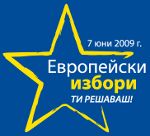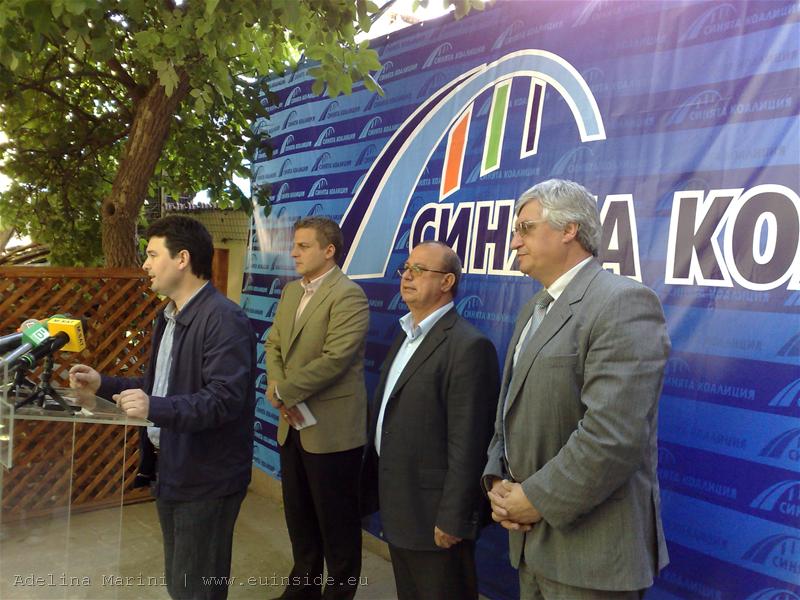Is there whom to vote for on the European elections in Bulgaria
Adelina Marini, May 2, 2009
 The scandal, the dirt and discrediting, the abuse of power in the name of making the opponent look dirty and the conscious defection from discussions about policies, have turned into tradition in election campaigns in Bulgaria. And this is the main reason for the low turnout because it repels the active, young people and those who would think when doing something, it repulses them and makes them look for single solutions. But in today's globalised world single solutions are no longer possible.
The scandal, the dirt and discrediting, the abuse of power in the name of making the opponent look dirty and the conscious defection from discussions about policies, have turned into tradition in election campaigns in Bulgaria. And this is the main reason for the low turnout because it repels the active, young people and those who would think when doing something, it repulses them and makes them look for single solutions. But in today's globalised world single solutions are no longer possible.
The European elections, unfortunately, will not be an exception. That is why I've decided to present to you, as far as it is possible, what the main parties in Bulgaria will fight for at the upcoming elections. And why should you care? Because Bulgaria will have the opportunity, according to the Nice Treaty, to have 17 MEPs who will work in a Parliament with significantly increased powers. By now the EP was something like a forum, its powers have been increased and, if the Lisbon Treaty comes into force, then the European Parliament would balance the Commission and the European Council. And that means that a good citizen representation would be useful in reaching specific goals.
For now I have chosen to present the selection of policies and candidates via the Internet sites of the political parties because this is the way you, the voters, would seek information.
 I will start with the DSB (Democrats for Strong Bulgaria) because their site attracted my attention as the most modern and European-looking. Taking into account that it is Bulgarian, it very much looks identical with the Internet sites of most European parties. But that appears only above. DSB will count on young people on these elections. Each one of them is presenting himself through a video clip, accompanied by a short CV. And that is exactly where the first problem appears because one should expect to hear the ideas and the goals of a candidate. With the slight exception of the third in the list Plamen Tsvetkov (no English version), who actually is the eldest and the 7th Anton Andreev (no English version), the rest stand in front of the voter and recites slogans. And the really young Rositsa Racheva even says that she wants to go to the EP to learn and then return to work in the Bulgarian parliament. Regretfully, unlike 2005, the DSB have not yet uploaded on their site their programme for the elections. Is it because they're pretty much occupied with the war against the Blue coalition or because no one really cares about programmes and policies anymore, I wouldn't presuppose.
I will start with the DSB (Democrats for Strong Bulgaria) because their site attracted my attention as the most modern and European-looking. Taking into account that it is Bulgarian, it very much looks identical with the Internet sites of most European parties. But that appears only above. DSB will count on young people on these elections. Each one of them is presenting himself through a video clip, accompanied by a short CV. And that is exactly where the first problem appears because one should expect to hear the ideas and the goals of a candidate. With the slight exception of the third in the list Plamen Tsvetkov (no English version), who actually is the eldest and the 7th Anton Andreev (no English version), the rest stand in front of the voter and recites slogans. And the really young Rositsa Racheva even says that she wants to go to the EP to learn and then return to work in the Bulgarian parliament. Regretfully, unlike 2005, the DSB have not yet uploaded on their site their programme for the elections. Is it because they're pretty much occupied with the war against the Blue coalition or because no one really cares about programmes and policies anymore, I wouldn't presuppose.
 The UDF are not quite in pace with modern Internet technologies, although their target group mainly consists of, indeed, advanced Internet users. They have presented their candidates via a .pdf file which leaves the impression of impossibility to commune with the presented people. The blue party has put in the first place of their list the little known Ani Tsvetkova. You could see the full list here (no English version). Regretfully I could not see anywhere in the site the UDF's programme for the elections, their ideas, what their goals would be if they have MEP's. Instead, they have published regulations, decisions, press conferences, speeches and articles. The UDF, as well as the DSB are members of the largest political power in the EP - EPP-ED (European people's party-European Democrats) but they do not have MEP's in the current Parliament.
The UDF are not quite in pace with modern Internet technologies, although their target group mainly consists of, indeed, advanced Internet users. They have presented their candidates via a .pdf file which leaves the impression of impossibility to commune with the presented people. The blue party has put in the first place of their list the little known Ani Tsvetkova. You could see the full list here (no English version). Regretfully I could not see anywhere in the site the UDF's programme for the elections, their ideas, what their goals would be if they have MEP's. Instead, they have published regulations, decisions, press conferences, speeches and articles. The UDF, as well as the DSB are members of the largest political power in the EP - EPP-ED (European people's party-European Democrats) but they do not have MEP's in the current Parliament.
 The Internet site of the NDSV (National Movement for stability and progress) leaves the impression of having a lot of information about the European elections and, surprisingly, that is true. The leader of the list has proven her European appearance - Meglena Kuneva who still is a commissioner, one of the most active and popular and who has for two consecutive years been elected as a European of the year in Brussels. The good thing is that her face is on the main page of the site exactly where policies section is. A disadvantage is the fact that the policies section is still not translated in English. But the Bulgarians will not remain lied to because when opening the policies section they will see what the main goals of the yellow party are. A possible disadvantage of the party might be, especially for the Parliamentary elections, their long stay in a government which repelled people and the not very clear connection with the DPS (seen as the ethnic party, representing the Turkish minority in Bulgaria). A good approach of the yellows is also the arrangement of their list of candidates for the European elections. They will rely on relatively popular and clean from politics names.
The Internet site of the NDSV (National Movement for stability and progress) leaves the impression of having a lot of information about the European elections and, surprisingly, that is true. The leader of the list has proven her European appearance - Meglena Kuneva who still is a commissioner, one of the most active and popular and who has for two consecutive years been elected as a European of the year in Brussels. The good thing is that her face is on the main page of the site exactly where policies section is. A disadvantage is the fact that the policies section is still not translated in English. But the Bulgarians will not remain lied to because when opening the policies section they will see what the main goals of the yellow party are. A possible disadvantage of the party might be, especially for the Parliamentary elections, their long stay in a government which repelled people and the not very clear connection with the DPS (seen as the ethnic party, representing the Turkish minority in Bulgaria). A good approach of the yellows is also the arrangement of their list of candidates for the European elections. They will rely on relatively popular and clean from politics names.
 The Internet site of the DPS (Movement for rights and freedoms) has definitely not been created to be of any use of the most popular type of an Internet user. The Movement has still not published its lists of candidates neither their policies. The DPS, together with the NDSV are members of the ALDE group in the EP, led by Graham Watson.
The Internet site of the DPS (Movement for rights and freedoms) has definitely not been created to be of any use of the most popular type of an Internet user. The Movement has still not published its lists of candidates neither their policies. The DPS, together with the NDSV are members of the ALDE group in the EP, led by Graham Watson.
The main page of the BSP (Bulgarian Socialists Party) leaves no doubt that this is the Internet  site of a socialist party. The first thing a visitor could see are workers with helmets, pictures with the Russian prime minister Vladimir Putin, roses. The socialists have also not published their lists of candidates.Instead, they have decided that publishing the latest opinion polls is pretty enough to make an undecided voter choose them as his representatives at European level. The BSP is a member of the Party of the European Socialists (PES) the second political power in the current EP.
site of a socialist party. The first thing a visitor could see are workers with helmets, pictures with the Russian prime minister Vladimir Putin, roses. The socialists have also not published their lists of candidates.Instead, they have decided that publishing the latest opinion polls is pretty enough to make an undecided voter choose them as his representatives at European level. The BSP is a member of the Party of the European Socialists (PES) the second political power in the current EP.
![]() Finally, probably the largest, according to the opinion polls, political power in Bulgaria which has all chances to have a lot of MEP's - GERB (Citizens for European development of Bulgaria). Regretfully, they are not an exception and have also not yet published their lists or policies. From the site you could see that GERB has the will and the wish to fight corruption. Their main programme, and only one so far, can be seen in the "Programmes" sector, is about the anti-crisis measures on which there was much before the campaign, a public debate on the national TV with the main opponent - the BSP. If one wants to find out what the GERB are fighting for, could see the sector "Positions". For the English speaking readers, please have in mind that the GERB Internet site doesnt have an English version or at least I couldn't find it.
Finally, probably the largest, according to the opinion polls, political power in Bulgaria which has all chances to have a lot of MEP's - GERB (Citizens for European development of Bulgaria). Regretfully, they are not an exception and have also not yet published their lists or policies. From the site you could see that GERB has the will and the wish to fight corruption. Their main programme, and only one so far, can be seen in the "Programmes" sector, is about the anti-crisis measures on which there was much before the campaign, a public debate on the national TV with the main opponent - the BSP. If one wants to find out what the GERB are fighting for, could see the sector "Positions". For the English speaking readers, please have in mind that the GERB Internet site doesnt have an English version or at least I couldn't find it.
 | © Adelina Marini | www.euinside.eu
| © Adelina Marini | www.euinside.eu